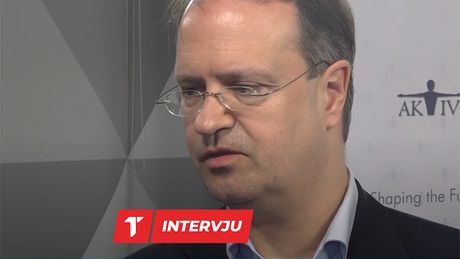Bodo Weber for Telegraf: What does Germany expect from Serbia? There are three key messages

German analyst and member of the Democratization Policy Council Bodo Weber told Telegraf.rs today that he does not believe there are deadlines when it comes to harmonizing Serbia's foreign policy agenda with that of the EU, but says it is clear Berlin and other Western officials expect Serbia to stop with the policy of "sitting on two chairs."
End policy of sitting on two chairs and impose sanctions against Russia
"That includes joining EU sanctions against Russia," Weber said.
Asked whether the fact that Serbia is 100% dependent on Russian gas is being taken into account, Weber said that there is a certain degree of understanding, especially from Germany, which is facing a similar problem, and that it would be objectively technically impossible for the European Union to replace Russian gas to Serbia from other sources if the supply from Russia gets interrupted.
Belgrade must show efforts to resolve elements of dependence on Moscow
"I believe that as long as the Serbian government is seriously working on the fastest possible diversification, Berlin and other capitals will have understanding for the special situation in which Serbia finds itself. It's important to see the will and real efforts for Serbia to solve the elements of dependence on Moscow, and to seriously, and not just semi-declaratively, move towards the European Union," said Weber.
Asked how we should interpret the fact that Germany has appointed a special envoy for the Western Balkans, Manuel Saracen, who was in Belgrade for the second time yesterday, Weber said:
"The way the minister of Foreign Affairs of Germany Annalena Baerbock, and in the meantime, German Chancellor Olaf Scholz, have said. That means that Germany has identified the Western Balkans as one of its foreign and European-political priorities," he said.
"The appointment of a special envoy is an expression of that, and it is especially useful now, when the political focus is on the Russian aggression on Ukraine," Weber added.
Fundamental "reset of dialogue" needed
Recently, German Chancellor Olaf Scholz organized a meeting in Berlin with President Vucic, Albin Kurti, but also EU Special Envoy for Belgrade-Pristina dialogue Miroslav Lajcak, and when asked whether Germany can unblock the dialogue, Weber said that it is important for Germany to take certain leadership in the dialogue, which has existed for half a decade only formally, but not essentially.
"A fundamental 'reset' of the dialogue is needed. Such an initiative must come from the highest levels in Berlin and Washington. But for that to succeed, it is necessary to first resolve the internal blockade of the EU enlargement policy, an agreement between Berlin and Paris is needed, because without a clear membership perspective, the union has nothing to offer to Serbia or Kosovo," said Weber.
He assessed that the meetings in Berlin were a good start, but that this is still far from a serious reset.
"That's why I'm not sure that a day in Berlin was enough to unblock the dialogue," Weber said.
(Telegraf.rs)
Video: Premijera predstave Kralj Ibi u Beogradskom dramskom pozorištu
Telegraf.rs zadržava sva prava nad sadržajem. Za preuzimanje sadržaja pogledajte uputstva na stranici Uslovi korišćenja.

